The script might be about the first-ever musical, but this year’s performance of Something Rotten Jr. by Provincetown Schools middle-school students is definitely a story reflecting plenty of experience and practice. It will be performed at the school’s Fishermen Hall on the evenings of May 9 and 10.
Provincetown Schools
ART AND WORDS
Workshops at FAWC Inspire Provincetown Schools Artists and Poets
A showcase of spring prints, dreamy cityscapes, and peace-seeking poems
PROVINCETOWN — Seven third-graders from the Provincetown Schools took the stage at the Fine Arts Work Center on April 11 to thank artist Vicky Tomayko for showing them how to make prints.
The students had taken a class in the center’s printmaking studio with Tomayko, etching their images on plates and running them through the press. The class was part of a program called “Directions: Collaborations in Art Making and Word Play,” part of a series of activities with artists from FAWC in March.
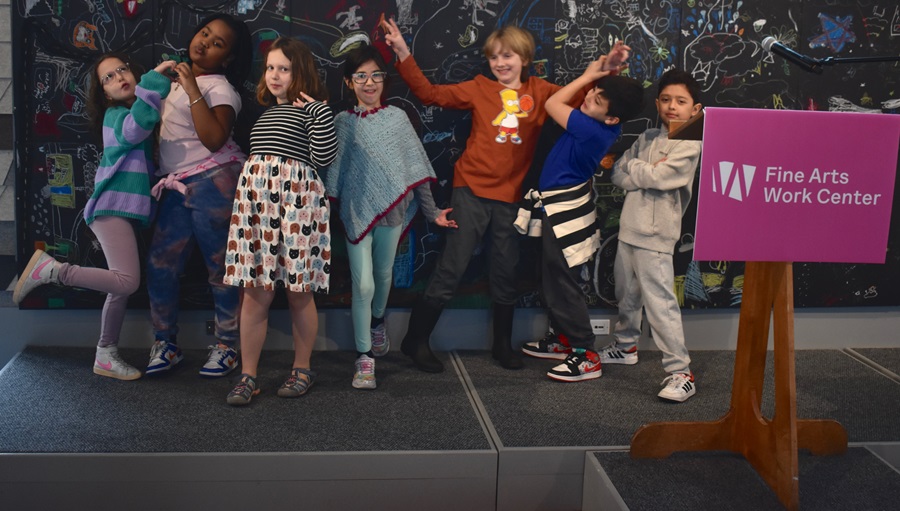
Eager to present their showcases, the students and about 30 audience members, mostly their peers, then followed Tomayko into the print shop, where the exbibit “Monoprints: Signs of Spring” was on display.
It was, says Tomayko, “One of my favorite days at the work center.” Tomayko is a longtime teacher at FAWC.
Ever Schneider was the first to show her work, a print featuring polka dots she made with a finger dipped in paint. Then Trent Burritt showed his print: “I went for a sunset and robins and blue jays — how they nest and stuff,” he said, “and some flowers sprouting.”
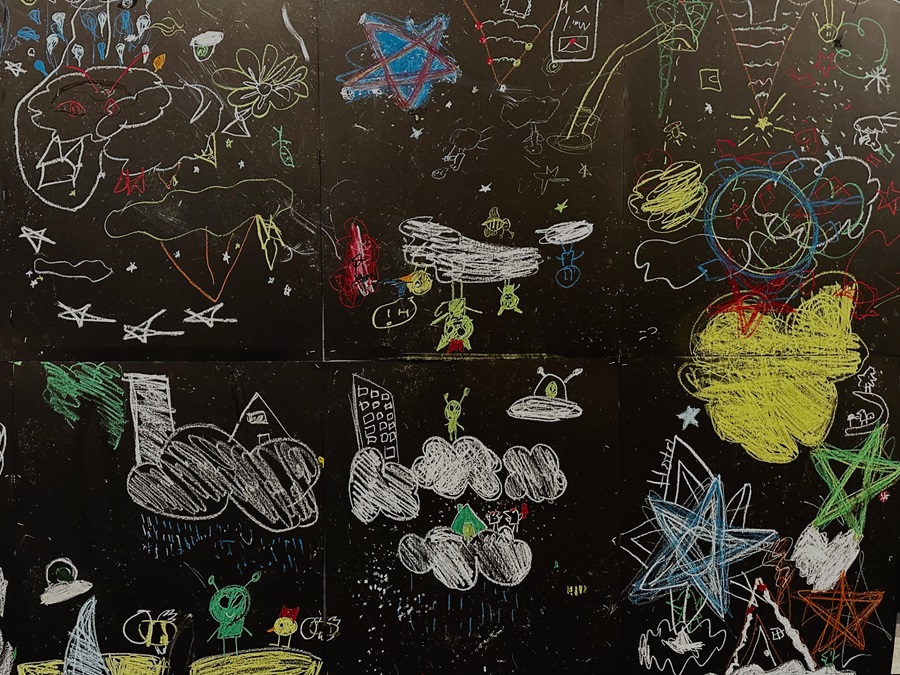
Julian Lima was next. “That’s a piece of pizza,” he said. “It’s cheese, because I’m a vegetarian.” His is a minimalist print of solid shapes in deep colors.
Lyla Keyes’s print shows birds coming out in spring and a heart-shaped figure. “Because sometimes, more in spring than summer and winter, I feel like I love the animals more and flowers and all the nature,” she said.
The students had previously created prints in their classroom illustrating events in the Revolutionary War, but at FAWC their works focused on color and shape. “How many of you want to continue making art for the rest of your lives?” asked painter and FAWC facilities director Jerome Greene. All of the students jumped up and raised their hands.
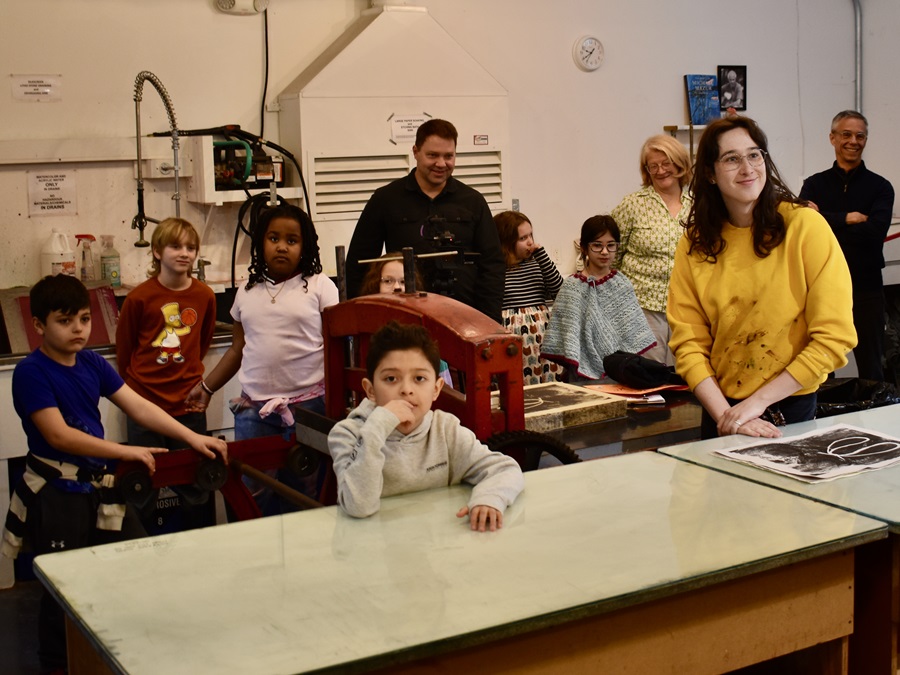
FAWC visual arts fellow Agnes Walden showed the students prints she made on heavy limestone. “The bigger the stone, the more prints you can make over time,” said Walden, explaining that the stone gets smaller and smaller as works are produced — “kind of what happens to limestone in a river.”
As part of the same collaborative artmaking series, sixth-grade students worked with visual arts fellow Rehab El Sadek and their teachers David McGlothlin and Michael Gillane on a mapmaking and city drawing project. The resulting mural was hung behind the stage by Greene, who said he rarely displays art in the work center’s Stanley Kunitz Common Room, but for the students he had made an exception.
During their workshop sessions, the students split into two groups. One group painted portraits while the other worked in the abstract. Jon Gunn, one of the sixth-graders, stepped up to the podium and described the left side of the imagined cityscape. “We did futuristic work,” he said. “Nike does flying shoes now — so I made shoes. I also made a robot chef that prepares all the food in the city.”
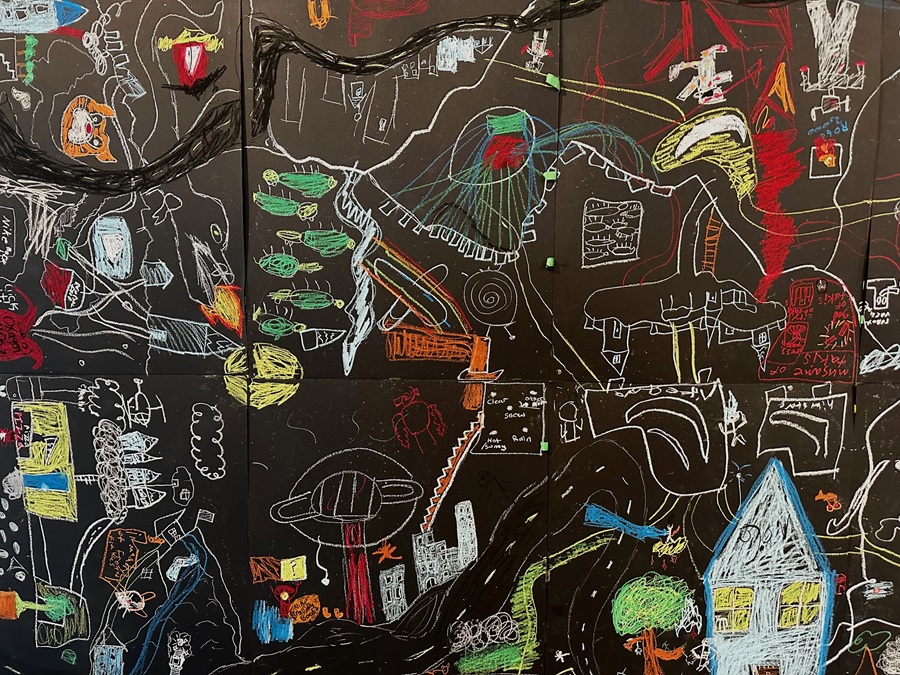
While sixth-graders made prints and drew maps, a group of middle-years students (grades six through eight) wrote poetry during their time at FAWC. “Today, we celebrate a roomful of talented and emerging writers,” said FAWC Director Sharon Polli, thanking poets Tyler Raso and David Hutcheson, who led a series of workshops with the students.

After each reading, middle-years language and literature teacher Amy Rokicki encouraged audience members to “snap, clap, and shower with praise” those who were reading.
Shakira Brooker’s “Nothing Good Lasts Too Long” addresses the death of her aunt. “Tears are words only God understands,” she read.
“I am peace when there is no war,” read Silas Hamilton, who had worked on his poem with Hutcheson.
“No disruptions, no pressure, just peace,” read DeAndre Luster.
“Keeping people’s hearts from breaking in the first place,” read Andrew Prada from “Happy,” his poem that tries to shift the listener’s mood.
Nath’allia Steele read a rhyming poem she titled “A Poem of Healing.” She wrote: “Forgiveness lingers in the shadows,” and “In the dance of heartbreak and forgiveness/ We find the strength to rise above the mess.”
Trinity Thibeau read, “I shine like the sun and smile at who I have become.”
After the reading, Rokicki chatted with seventh-grader Matthew Peres. “Last year, Matthew was locked in the bathroom for the readings and a teacher kept going in to try to get him out,” she said. “This year, after writing a beautiful poem with Tyler Raso, Matthew asked Tyler to read his poem for him. Then, on the bus here, he finally decided to read the poem.”
“I grew up,” said Peres.
Editor’s note: An earlier version of this article, published in print on April 18, incorrectly identified student Jon Gunn as “Joe” and teachers David McGlothlin and Michael Gillane as “Mr. Mac” and “Mr. Villains.”
THE ICELAND MODEL
Creativity and Connection Thrive on Winter Wednesdays
PROVINCETOWN — For the eighth year in a row, Wednesdays in winter have been brightened by free classes for adults at the Provincetown Schools.
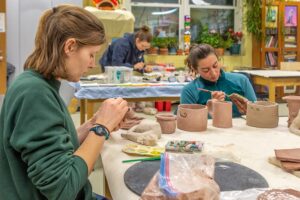
They begin in January, when even twilight is over by 5 p.m., and evenings can seem impossibly long. Headlights fill the Grace Hall parking lots as eight instructors and more than 100 students arrive for classes that include tarot reading, cookie baking, drawing, creative writing, and sculpting with clay.
The Winter Wednesdays program began in 2017 as a collaboration between Provincetown’s library, health dept., and schools, said Morgan Clark, the town’s former health director.
“The school was about to eliminate its traditional adult education classes, which cost about $60 a season, because so few people were showing up,” said Clark. “Meanwhile, the library was looking to do more community programming, and the health dept. was trying to fight isolation.
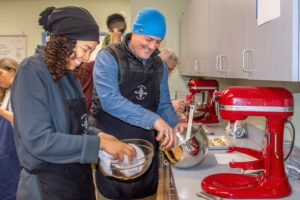
“There’s a whole school of thought in public health that the opposite of addiction is connection,” Clark said. From the beginning, Winter Wednesdays followed the “Iceland model,” named for a successful campaign against youth addiction in that country that emphasized removing barriers to social participation.
“Iceland reduced its substance abuse numbers drastically by removing barriers, which is why Winter Wednesdays classes have always been free and have always included free rides and child care,” Clark said. “We also originally didn’t require registration or allow the classes to build on the week prior, because we wanted people to feel free to drop in halfway through or switch classes every week.”
That aspect has changed — instructors are now allowed to design classes that build from week to week — and the program has also grown. The Truro Health Dept. joined in 2022, and a grant secured by Outer Cape Community Solutions extended the program to all four Outer Cape towns the next year.
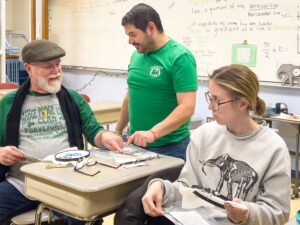
Courses were taught at seven different locations this year, including each town’s library, and 10 classes were taught entirely online — a legacy of 2021, when Covid turned the program into an online-only “Winter Whenevers.”
Provincetown Library Director Amy Raff and the program’s part-time coordinator, Shane Landry, kept the program going in that difficult Covid year, Clark said. “Honestly, Shane was a volunteer in 2017, and he took the challenge on and figured it out — he’s made the entire thing work,” Clark said.
The coordinator is paid a stipend, and instructors receive $50 per class. The program pays for all kinds of materials — even the tea and cake for the online “death café” discussion group.
After seven years as coordinator, Landry has passed the job on to Lesley Marchessault, who lives in Wellfleet.
“We want to keep this beautiful energy in Provincetown and expand what we’re offering in the other towns, particularly by recruiting more teachers,” said Marchessault. “There’s a lot more we can be doing in the Outer Cape towns, and putting the word out in the community is how we’ll get there.”
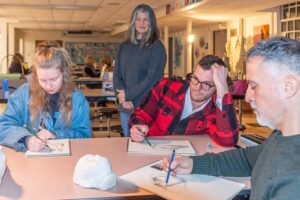
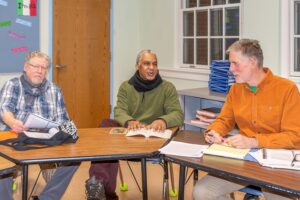
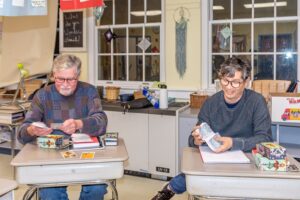
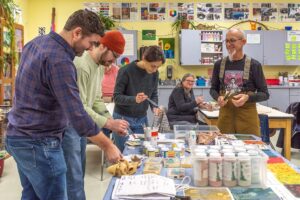


PUMPING IT UP
A Shout-Out for the Provincetown Cheer Team
Students defeat faculty at basketball to chants from a first-rate fifth-grade squad
PROVINCETOWN — It’s T-minus-one day until the first-ever halftime show for seven cheerleaders at practice on Feb. 15. Fifth-grade energy abounds, and arms punch high. Then the cardboard parcel of black-and-white pom-poms appears, and the cheers begin, one after another, with hardly a breath in-between.
EARLY CHILDHOOD
Funds but No Staff to Grow Infant-Toddler Program
Without two new employees, school can’t add third child-care room
PROVINCETOWN — With a mix of federal and municipal funds already secured, a third infant-toddler room at the Provincetown Schools is ready to open its doors. There’s just one thing missing: the two new staff members required.
“We’re waiting for the ship to sail, but we don’t have any sailors,” said Tessa Bry Taylor, manager of the Provincetown Schools Early Learning Center. “We can’t do it without them.”
At the beginning of June, the school won $362,801 in federal American Rescue Plan Act funding to open another room for its infant-toddler program, which serves children from eight weeks to three years old. With $25,000 in reserve funding from the finance committee and an additional $100,000 earmarked in the school budget, the ARPA grant brought the total capital available for expanding the program to just under half a million dollars.
With that money, the school has already done much of the legwork to set up the third room, including retrofitting a pre-K classroom in the Veterans Memorial Community Center to meet infant-toddler requirements. The goal was to be up and running by Aug. 1, Bry Taylor said.
The schools began trying to hire additional infant-toddler teachers even before the ARPA grant came in. They posted the two openings in May, internally and on SchoolSpring, the school jobs board website, according to Provincetown IB Schools Administrative Assistant Darlene Van Alstyne. The salary range for the jobs, which include benefits, is $40,000 to $45,000.
The school has received zero applications for the two positions, Van Alstyne said.
There are currently 28 families on the waiting list for infant-toddler spots. That number has jumped from five this past winter, according to Bry Taylor.
Despite the reality of an aging population, “it continues to be extremely evident to me that there needs to be more child care on the Outer Cape,” she said.
“It’s just getting worse by the day,” she told the Independent last week. “In the last 72 hours, I’ve received four additional inquiries,” she said, from parents looking to enroll their children.
The infant-toddler program is one of a handful of early childhood caregiving options on the Outer Cape. But the others — including Earthstar Play School in Truro, the preschool at Truro Central School, the Wellfleet Montessori Preschool, and My Little Island Preschool in Wellfleet — also have waiting lists, Bry Taylor said.
Provincetown’s program is free for children of residents and town employees. And with child-care voucher programs up and running in Truro, Wellfleet, and Eastham, very few families pay the full per-diem price.
The program’s two existing rooms, which are staffed by four teachers, are sufficient for the 21 children already enrolled. A third room would allow the program to accept at least nine more kids.
The Outer Cape is not alone in coming up short on child-care hiring. Bureau of Labor Statistics data from 2022 indicate that roughly 100,000 child-care workers nationwide had left for other jobs since the pandemic began.
In the recent round of Barnstable County-distributed ARPA grants, child-care organizations received $1.1 million of the $5 million available, the largest share of any sector.
It’s a draining but rewarding profession, Provincetown Schools Supt. Gerry Goyette said. “If I retired, I would totally work up there, because they are so adorable,” he said. “I mean, you go home dead tired, but they are a lot of fun.”
THE SCHOOL MUSICAL
Provincetown Packs the House for Once Upon This Island, Jr.
Students chose this year’s show, a Caribbean coming-of-age story
Students at the Provincetown Schools wrapped up their theater season last weekend with sold-out performances of Once Upon This Island, Jr. The musical is an adaptation of the show that opened on Broadway in 1990 and had a hit revival in 2017, with lyrics by Lynn Ahrens and music by Steven Flaherty.
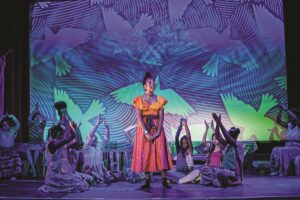
Theater teacher and music director Megan Amorese said the students in her middle school music elective chose the show. “I believe the music and the story spoke to them,” she said. “The show taps into the rich cultural heritage of the Caribbean.” It explores social conflict and also gave students “so much opportunity to express themselves and their cultures — particularly through dance.”

Based on the novel My Love, My Love by Rosa Guy, it is a coming-of-age story that takes place on a tropical island. In it, Ti Moune, played by Shakira Brooker, is a girl from a poor family who falls in love with Daniel, a boy from a rich one, played by Ragime Patterson, and discovers her inner strengths confronting the boundaries that divide her community.

Amorese invited a photographer to the dress rehearsals, which are not about the costumes, she said. “The reason we have dress rehearsals is to rehearse having an audience,” she said. “It changes so much to have applause and laughter.”
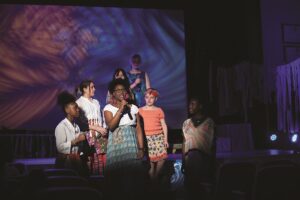
The students performed two matinee previews, one especially for Truro students and another the next day for Provincetown students. “That’s the hardest show for the kids,” said Amorese. The students get nervous about performing for their friends, she said.
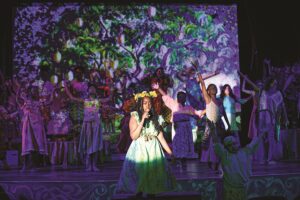
When the time came for the Friday and Saturday shows at Fishermen Hall, “We packed the house both nights,” said Amorese. “Our audiences were so supportive and enthusiastic.”
Amorese sees the theater program as part of how the school helps students “find their unique ways of being successful. The pride the students feel afterwards is why I do what I do.”

One student put it this way after the show: “It feels so good to be great at something.” —Teresa Parker
ENDANGERED SPECIES
Student Count Keeps Falling at Nauset High School
Truro and Wellfleet elementary schools also see decline
EASTHAM — Enrollment numbers for the Outer Cape’s public schools have finally arrived, and they show that existing trends here are getting worse. This year’s total enrollment in the Truro and Wellfleet elementary schools declined about 10 percent compared to the 2021-2022 school year. Nauset Regional High School in Eastham lost 6 percent of its student count, falling from 833 in the previous school year to 780 this year.
On a five-year time horizon, though, the situation at Nauset High looks more serious. In 2018 there were 937 students at the high school, and the numbers have declined by an average of 39 students every year since then, for a total loss of about 17 percent of the 2018 student count.
The Truro and Wellfleet elementary schools have had both ups and downs over the last five years, for a net loss of only about 7 percent of enrollment since 2018.
Eastham Elementary has had ups and downs as well; it has six fewer students this year compared to last. Over five years, however, it has come out ahead, going from 171 students in 2018 to 186 this year.
The Provincetown Schools, which include prekindergarten through eighth grade, are the outlier, having gained students every year since 2018.
The Nauset Regional High School renovation project was designed for an enrollment of no more than 905 students, based on a 2017 analysis conducted by the Mass. School Building Authority that projected a 2022 enrollment of 887 students.
That is 107 more students than actually enrolled this year. Even the projected number would have been well below Nauset’s 2010 enrollment of 972 students.
Nauset Regional Middle School has a student population of 533 this year, down about 6 percent from its 2021 enrollment.
Regional school committee Chair Chris Easley pinpointed several reasons for the decline. According to Easley, the ongoing construction at the high school’s campus, along with the modular structures that house temporary classrooms for students, are a deterrent for many families.
“Getting people to send their children to a school that is going to be under construction is a negative,” Easley said.
He also said the newly renovated Cape Cod Regional Technical High School in Harwich and the new Cape Cod Christian Academy in Brewster, which opened in 2020, contributed to the drop in Nauset High and Middle School numbers.
“We have a Christian school that is bursting at the seams and a new tech school that has impacted enrollment,” Easley said. “We are just coming out of Covid, so we know there are also a bunch of kids that went into homeschooling.”
“We’re kind of in a perfect storm as far as numbers,” Easley added.
Easley said that, despite the decline, Nauset cannot automatically fill its empty seats with school-choice students. These students come from towns outside the four-town school district, like Truro and Provincetown, which have agreements with the Nauset district to allow their grade 7 to 12 students to attend Nauset schools for a tuition fee of about $18,500 per student.
These agreements allow Truro and Provincetown to maintain direct control of their elementary schools, while Wellfleet and Eastham elementary schools are part of the Nauset District.
“School choice numbers are set in the spring for the following year,” Easley said. “It’s an established number.”
The school enrollment numbers across the Outer Cape portend a difficult path ahead, Easley said.
“The Cape is going to really have to address its school populations,” he said. “It’s going to take a long time for education to recover from Covid.”
THEATER
Behind the Scenes at ‘Beauty and the Beast’
Musical theater brings Provincetown Schools students together again
PROVINCETOWN — Dress rehearsal is about to begin, and students are dancing around stage lights and props with all the giddiness of an ensemble that’s preparing to take the stage again after three years without a production.
PROVINCETOWN: THIS WEEK'S CURRENTS
New Regs Block Sal’s Seating
Some meetings in Provincetown are in person, some are online, and some are both. Click on the meeting you want to attend on the calendar at provincetown-ma.gov for a link to an agenda and details.
Thursday, May 5
- Council on Aging, 10 a.m., Veterans Memorial Community Center
- Zoning Board of Appeals, 6 p.m., Town Hall
Monday, May 9
- Select Board, 6 p.m.
Tuesday, May 10
- Licensing Board, 5:15 p.m., Town Hall
- Annual Town Election, polls open 7 a.m. to 7 p.m., Town Hall
Wednesday, May 11
- Cemetery Commission, 3 p.m.
- Public Pier Corp. Board, 5 p.m.
Thursday, May 12
- Bicycle Committee, 10 a.m., virtual
- Planning Board, 6 p.m., Town Hall
Conversation Starters
New Regs Block Sal’s Seating
A ruling by the select board will end the table service on the beach behind the home of Sal’s Place neighbor Greg Connors.
Since the summer of 2020, restaurant owner Siobhan Carew has been serving patrons on the beach behind her restaurant at 99 Commercial St. and behind Connors’s house at 101 Commercial St. Connors, who has been in a battle since 2016 with Carew in Land Court over an easement, has added what he contends is the illegal use of the beach to his suit.
Land Court Judge Michael Vhay had sided with Connors and issued fines and injunctions against Carew. But in November the judge recognized that the beach at mean high water, where Carew put her tables, is owned by the Commonwealth of Massachusetts and is not Connors’s private property. Vhay vacated nearly $100,000 in fines and legal fees imposed on Carew and ordered all the parties to renegotiate.
Those negotiations, however, are fitting the pattern established when Connors and Carew first became unhappy neighbors. Connors is still suing and demanding that Carew pay his attorney fees of $77,253, according to court documents.
Up until this point, the select board has backed Carew by granting a permit to allow the seating behind Connors’s home. But on April 25, the select board extended the pandemic-era outdoor seating allowances town-wide to anyone “who has site control,” Assistant Town Manager David Gardner told the Independent. The board has “no ability to approve the use of the beach,” said Gardner. “That approval would need to be obtained by the Commonwealth.”
$750,000 for East End Park
The state has awarded the town a $750,000 grant to help defray the cost of landscaping Cannery Wharf Park, also known as the East End Waterfront Park, at 387 Commercial St.
Town meeting voters just appropriated $1.8 million to add bathrooms, grass, shrubs, bike racks, and A.D.A.-compliant pathways to the former parking lot.
The grant, from the state’s Land and Water Conservation Fund, must still receive final approval from the U.S. Park Service, which could take a few months, said Town Manager Alex Morse.
Voters at the May 10 town election must still approve the full $1.8 million as a debt exclusion for the town to be awarded this grant. The town must show the park service that the project is fully funded, Morse said.
Supt. Scallion Retires
Provincetown Schools Supt. Suzanne Scallion will retire in June after three years at her part-time job.
The Provincetown School Committee will be meeting throughout the spring to write a job description and figure out next steps, said chair Eva Enos.
Scallion told the Independent she plans to retire from administration but will continue “consulting and coaching principals on a part-time basis and do some volunteering. It’s been a very busy three years.” —K.C. Myers
COVID UPDATE
An Uptick in Cases at Outer Cape Schools
Continued testing, more vaccinations, and a few new precautions
It’s been a tentative return to school for Outer Cape students after a nearly two-week-long holiday break.
At the start of this week, school officials reported rising case counts and higher than usual absences among both staff and students.
In the week before the holiday break, Provincetown had no Covid cases among students or staff, according to the weekly report from the Dept. of Elementary and Secondary Education (DESE).
But on the afternoon of Monday, Jan. 3, the first day back, five asymptomatic cases were identified when Provincetown Schools nurse Mary-Beth Maloney tested every student and staff member with rapid tests. “We wouldn’t have known about those cases if we hadn’t tested everyone,” said Supt. Suzanne Scallion.
In addition, about a third of the staff and students were absent Monday due to a combination of Covid-19 worries and travel delays, Scallion added.
Truro also had no cases among students or staff before the break. Supt. Stephanie Costigan gave families credit for that.
“Parents have been screening children and keeping them home if they have symptoms,” Costigan said. On Monday, Truro knew of one case identified during the break, she said. Staff were tested on Sunday before school started, with no positive results.
Wellfleet had two cases among students and none among staff. Eastham reported one case among students and none among staff, according to the DESE data.
Following a professional development day on Monday, students and staff at Wellfleet Elementary School and Nauset Regional High School returned in person Tuesday. There were three cases reported at the elementary school, with five absences. At the high school, there were 20 cases and 30 students absent, according to Interim Supt. Brooke Clenchy.
But the numbers were similar to what they’d been prior to the winter break, Clenchy said. “We saw cases begin to rise about two weeks after Halloween,” said Nauset Public Schools nurse leader Mary Ellen Reed.
At a press conference on Monday, Gov. Charlie Baker said he expected the return from holiday break to be “a challenging period of time,” but he held his position that all 180 days of in-person learning should take place this school year.
During the holiday break, superintendents across the Commonwealth had Zoom meetings to plan for the students’ return, Scallion said. Districts also received 227,000 at-home test kits from the state.
“We were distributing kits on New Year’s Eve,” Scallion said. “It’s been a very busy week for us to prepare for the opening. I think we’re ready.”
The new Omicron variant spreads more easily than the original SARS-CoV-2 virus, according to the Centers for Disease Control and Prevention. But while breakthrough infections are likely to occur, current vaccines are expected to protect against severe illness, hospitalization, and death.
Updated Procedures
Provincetown Schools are now requiring three-ply masks. “Our kids are all in surgical masks,” Scallion said. “If they have a cloth mask, they’re required to wear a surgical mask under it.” The school is also reverting to the procedures followed when the first outbreak hit: not having two classes in the lunchroom together, taking mask breaks outdoors, and creating smaller groups for recess.
Pooled testing is slated to resume Thursday, nurse Maloney said. It involves mixing several test samples together in a batch and then testing the pooled sample with a diagnostic PCR test. The approach increases the number of people who can be tested using the same amount of laboratory resources.
Truro Central School has not changed any protocols, Costigan said: masks remain required indoors, as does physical distancing of three feet when masked and six feet when unmasked. She added that the school is looking at options to have more tests available.
All Outer Cape schools continue to participate in the state’s “Test & Stay” program, in which students identified as close contacts of anyone who has tested positive are tested daily for at least five days following initial exposure. Students may remain in class if their daily test results are negative.
All the schools also provide testing for students and staff who get symptoms during the school day.
Nauset schools will continue their regular pooled testing program, Clenchy said. In accordance with the CDC’s latest advice, the school will shorten its recommended quarantine and isolation period from 10 to 5 days, followed by 5 days of required masking.
Vaccination Clinics
A few vaccination clinics will be available for students and staff across the Outer Cape in the coming weeks. Provincetown Schools is hosting one on Jan. 6, offering first, second, and booster doses from 1:30 pm to 3:30 pm.
Five- to 11-year-olds are now eligible for Covid-19 vaccinations, and boosters were just approved Monday for children 12 and over. While vaccinations are not required in schools, Maloney said, almost all students are getting them.
Truro Central School was scheduled to hold its first vaccination clinic Wednesday, Jan. 5. The clinic was to be open to the public, providing initial vaccinations and boosters for all eligible age groups.
The Nauset School District has already had five vaccine clinics in the fall. There was a clinic in Wellfleet on Monday, Jan. 3 and another one is planned for Jan.13, Reed said.
TESTING
As All Students Return to Class, Covid Cases Are Expected to Rise
State to publish weekly numbers for school districts
None of the Outer Cape’s public schools had any Covid-19 cases in the state’s first report of positive tests, issued last Thursday. But as of Tuesday this week, cases were starting to appear, with two reported in Provincetown, one at Nauset Regional High School in Eastham, and one at Nauset Middle School in Orleans.
Statewide, last week’s report showed 1,230 cases of Covid-19 among the 920,000 students who had returned to classrooms. There were 190 positive tests among 140,000 staff members during that same period.
The numbers were from just three days, Sept. 13 to 15. Going forward, the reports will be published each Thursday and reflect positive tests in the state’s public schools for the previous seven days. The state has done away with remote learning this year, so with more students in the classroom, case numbers are expected to be higher than last year.
What’s different this year are new testing programs that mean fewer teachers and children will have to be quarantined.
On Tuesday, Provincetown Schools Supt. Suzanne Scallion told the Independent that, because the district is small, she did not want to say whether the two cases found there were among students or staff.
She did explain the school’s new testing protocol. When a case of Covid is identified, all students in that class and any other asymptomatic children considered close contacts are tested daily for at least five days with the BinaxNOW rapid antigen test. The tests are provided free by the state. The students can remain in school as long as they test negative.
If parents have opted out of the testing program and their children have been in close contact with an infected person, the children must be quarantined.
“We do not have any parents who have declined,” Scallion said.
This year is not much different from last year in terms of protocols like masking, Scallion said, but “we’ve come a long way,” she said, thanks to the tests.
Truro has its own prekindergarten through grade 6 school district, with 112 students. Principal Patrick Riley reported Tuesday there had been no positive tests there so far. Truro also is participating in the state’s test-and-stay program, Riley said, though in his district not all parents had returned forms allowing their children to participate.
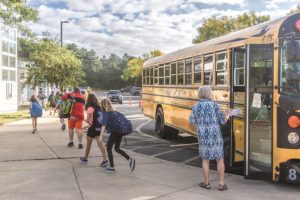
Riley noted that it is still early in the year. “We’ll circle back to the parents who haven’t returned the forms,” he said.
The state does not require students to wear masks outdoors. Truro students were initially allowed recess only with the children in their classrooms, but after conferring with Truro Health Agent Emily Beebe, Riley loosened that restriction, allowing multiple classes to be outside without masks.
The state requires a distance of at least three feet between students indoors, with all wearing masks. “A lot of classes can maintain more than three feet,” Riley said.
When three-foot distancing can’t be accomplished, such as during one-on-one instruction, staff can wear additional protection, such as multiple masks and face shields.
Mary Ellen Reed, lead nurse for the Nauset Regional School District, said Tuesday there had been three cases in her district — two students and one staff member: one from Nauset High School, one from Nauset Middle School, and one from the Eddy Elementary School in Brewster.
The district’s other schools — Eastham Elementary, Wellfleet Elementary, Orleans Elementary, and Stony Brook Elementary in Brewster — had not yet had any cases, Reed said.
Nauset is not currently participating in the state’s test-and-stay program, although Reed said the district is trying to register for it. At this point, the school nurses in the district perform rapid tests on anyone who shows symptoms while at school but not on children who are asymptomatic.
The Nauset schools are taking other steps to keep students and staff safe. They allow staff and students in the buildings only during the school day. Visitors and volunteers, including parents, are not allowed inside. When there is a positive test, those who are considered close contacts must quarantine for seven days (close contact is defined as sitting within three feet of an infected person). Asymptomatic close contacts may return after five days if they test negative, but “we still actively monitor them for symptoms through 14 days,” Reed said.
Masks are currently required indoors statewide until at least Oct. 1 for students, teachers, and staff, whether vaccinated or unvaccinated. After that date, fully vaccinated students and staff, where at least 80 percent of the school population has been vaccinated, may not have to wear them, according to the state’s rules.
At present, children 12 years and older can be vaccinated against the Covid-19 virus. Pfizer may soon have vaccine approval for ages 5 through 11, according to news reports.
Scallion said that will be a great relief. “We worry for our kids who are not vaccinated,” she said.
The state report published last week showed other Cape Cod school districts with Covid cases: Monomoy reported six students and one staff member; Falmouth had 16 students and one staff member; Dennis-Yarmouth had six students; Barnstable had 12 students; and Bourne and Mashpee each reported one case among students.
Those numbers will be updated on Thursday, Sept. 23.
BACK TO SCHOOL
Masks Likely to Be Required at Schools on Outer Cape
With no remote option, all students will be back in classrooms this fall
As vaccination rates ramped up last spring and the daily count of Covid-19 cases came down, many hoped this fall’s start of school could feel more like normal. That no longer seems like a possibility.
School officials on the Outer Cape are discussing Covid-related safety protocols as they prepare to open classrooms on Tuesday, Sept. 7. Remote learning is not an option in Massachusetts, so all students will attend classes in person, five days a week.
Provincetown, Truro, and Wellfleet currently are under board of health orders requiring universal masking indoors, due to the recent spike in cases. Meanwhile, across the state, school officials had been putting off decisions on masks, hoping Gov. Charlie Baker would mandate them. The governor, however, continues to make it clear he is leaving the decision on requiring masks in the hands of local districts.

In late July, the Dept. of Elementary and Secondary Education (DESE) and the Dept. of Public Health (DPH) made a series of “recommendations” — not mandates. They “strongly recommend” that all students from kindergarten through grade 6 wear masks when indoors, except those with certain medical conditions or behavioral needs. Masks are unnecessary outdoors.
The state guidance also recommends that vaccinated students not be required to wear masks, but it recommends a mask requirement for all unvaccinated staff and any unvaccinated students in grade 7 and above.
A federal order requires that masks be worn on all school buses.
The Mass. Teachers Association’s board of directors took issue with the state’s guidelines, calling on the governor to follow the mask guidance offered by the Centers for Disease Control and endorsed by the American Academy of Pediatrics, which calls for mandatory masks from pre-kindergarten through higher education, regardless of vaccination status.
“Universal masking and social distancing must remain in place for the foreseeable future,” the MTA board wrote. But neither the governor nor the state agencies have shifted their positions.
Provincetown Schools Supt. Suzanne Scallion described her schools as “the canary in the coal mine,” based on this summer’s jump in cases. “We are still developing protocols, but we will likely be back in masks,” Scallion said. “Right now, the mask policy from last year is still in effect.”
Provincetown students are housed in the former high school, which has high ceilings and a lot of space. Last year, school officials increased the air exchange rate in the rooms to four times each hour. “We stayed relatively healthy last year,” Scallion said.
Because the lunchroom isn’t well ventilated, though, students ate in their classrooms. “That will likely continue this fall,” she said.
Scallion envisions universal masking. The district comprises pre-kindergarten through grade 8, so some of the older students have likely been vaccinated. Still, at present, vaccinations are available only to those 12 years old and older.
Eva Enos, chair of the Provincetown School Committee, said in an email that her panel is “thrilled to welcome our students back to school for in-person learning.” The committee has a meeting next week and will take up the masking issue then, but “we have had no complaints about mask wearing in the past, and I have not heard of any now,” Enos said. “I think parents are simply grateful that the kids can go to school in person.”
Truro has its own pre-kindergarten through grade 6 school district. Classes are set to get underway Sept. 7. The Truro School Committee is expected to make a decision on Covid protocols at its meeting on Aug. 19.
While Eastham and Wellfleet have their own elementary school committees, the schools are part of the Nauset Regional School District, with Brooke Clenchy as interim superintendent.
The regional school committee’s policy subcommittee met Tuesday and voted to keep mandatory masking in place for all, but that’s just the first step. The final decision will be made by a joint meeting of all the district’s school committees on Aug. 23.
Clenchy said all the superintendents on the Cape have been communicating with each other regarding fall requirements. “We weren’t sure whether the governor or [education] commissioner would change their minds, so we were all hanging tight,” she said Monday. “It’s clear now that they’re not going to do it, so we’re all pulling in our school committees.”
The Nauset superintendent called masking a sensitive issue. “I’m getting calls from both sides,” she said. Some are strongly opposed to masks, she said, but the medical community is calling for them to be universal.
Nurses from the district have been in touch with state health officials, and they will relay that information to the school committees.
“At the end, we have to look at it and say, ‘What’s safe for our children, our staff, and our communities?’ and that has to be what guides us,” Clenchy said.
Anne Needel, a teacher at Nauset Regional Middle School, noted that sixth-graders are still below the age for vaccination. “I think that we’re assuming we’ll all have to wear masks,” she said. Needel believes most of the teachers at her school have been vaccinated. “I personally don’t know any teacher who is unvaccinated,” she said.
Other safety measures, including hand-washing stations and sanitizing, will be in place as well this year. And while one infection among students could force a whole pod of children into quarantine for several days last year, a new “stay and test” method will allow all but those with positive tests to remain in class. Under the program, students in close contact with someone who tests positive can remain in school as long as they have the BinaxNow rapid antigen tests done at school daily for five days and remain virus-free.
Deidre Arvidson, the Barnstable County public health nurse, said that, from what she’s hearing, most schools on Cape Cod will require masks. “There’s been a lot going on, so I think most will start with masks, at least until all ages can be vaccinated,” she said.
BUFFETED BY HISTORY
The Class of 1965 Looks Back on 56 Years
13 classmates gather at the Provincetown Inn to reminisce
PROVINCETOWN — Stephen DeRiggs, a Provincetown High School junior, was getting off the ferry the day before the annual Nantucket-Provincetown football game when he heard the news. The president had been shot.
It was Friday, Nov. 22, 1963. The game the next day in Nantucket was one of only two in the state that were played that weekend.

Back home on the day after, a Sunday, DeRiggs saw Jack Ruby shoot Lee Harvey Oswald on national television.
On June 23, 13 members of the Provincetown High School Class of 1965, including Stephen DeRiggs, gathered at the Provincetown Inn for their 56-year reunion. Those 13 made up exactly one quarter of the graduates, who numbered 52 that year. Their stories illuminate the tumultuous history of their coming-of-age years.
Fifteen months after President Kennedy’s assassination, on Feb. 21, 1965, Malcolm X was murdered. That summer, riots broke out in Los Angeles; the following year, riots erupted in Newark and Detroit. On April 4, 1968, Martin Luther King Jr. was assassinated, followed on June 6 by Robert Kennedy.
The Stonewall riots started on June 27, 1969.
Meanwhile, the Vietnam War intensified, with more American troops and mounting public opposition. In 1963, draft cards were burned in protest for the first time. Protests spread on college campuses, and four students were killed by the National Guard at Kent State University in Ohio on May 4, 1970.
Provincetown’s Class of 1965 may have appeared to be, as DeRiggs said, “a little insulated” from racial and other traumas. But the class developed resilience — born of a culture of work and a deep sense of community. “There may have been a cloud over things,” he said, but he knew he had to get on with living.
Partly in response to the world he graduated into, DeRiggs went on to college and devoted the four years after that to working for the Bureau of Indian Affairs as a teacher on reservation schools. Forty years of teaching history and psychology in public schools in Pennsylvania and other states followed.
Paul Mendes, another member of the class, had grandparents who came from Portugal to Provincetown in the early 1900s. His father was captain of the Leona and Gabriel, a fishing boat. Mendes’s parents, John and Leona Mendes, also operated the Long Point View Guest House seasonally from 1946 until 2001. “They taught me family values that have sustained me to this day,” Mendes said.
Post-Vietnam Service
“What was happening in Vietnam upset me,” said Mendes. He had set out to study business, but instead, in Boston, “I walked down to the U.S. Marine recruiter and signed up for four years.”
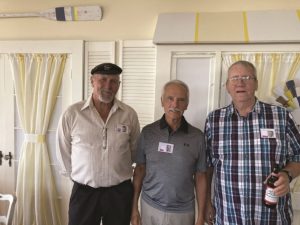
Mendes told the recruiter he was interested in guns, and the sergeant assured him the Marine Corps had lots of them. “That is how I ended up a weapons specialist,” Mendes said. But making and losing friends in the war had a profound impact.
“Upon returning from Vietnam in August 1967, I sold my guns and only fired once a year as required for a police officer,” he said.
An interview with Provincetown Police Chief James Meads in 1970 launched Mendes’s career as a police officer, “a career that I loved,” he said.
That same year, he said, “I saw the woman who would become my wife, Victoria Andrews.” She, too, had been a classmate, “but we never talked much,” Mendes said. In 10 days, the couple were engaged. They now have two grown sons.
In a class with 31 male graduates, six enlisted in the military and subsequently had long careers in the Provincetown Police Dept. One of those six, Robert Russell, commented that they were “the last generation to stay in such numbers to serve the town.”
Adventure and Privilege
Elizabeth Perillo’s last name was Lema when she was growing up in Provincetown. “After our daily chores,” she said, “we kids were left on our own with the only rule being to get home before dark.” Her adventures included making the day-long 20-mile bike ride to Wellfleet, provisions intact.
“I’m told there was discrimination against the Portuguese at some point, but I never noticed,” Perillo said. “I mean, there were the older high school girls who threatened to dunk us freshwomen in the rest rooms of town hall. They dragged us there, but never went through with it.”

Perillo was aware instead of her privilege. “After all,” she said, “the Portuguese fishermen and their families were the wealthiest folks in our town.” She remembers her high school years as the best years of her life.
After graduation, Perillo went to work for the Cape Cod National Seashore, and, in 1967, was transferred to the Dept. of the Interior in Washington, D.C. She remembers protests following Martin Luther King’s assassination, and what it felt like to walk through a crowd and feel the protests turn violent. “That was the beginning of maturity,” she said.
Listening in on a day’s worth of stories revealed the class consensus on one most-fondly-remembered event. It was the time the high school basketball team won the Class D state championship at Boston Garden.
Stephen DeRiggs was a key player in that group, which he described as a “small, quick team” with no player taller than six feet. They won the semi-final game by one point, showing the “grit,” DeRiggs said, that characterized the team. The students called the players “the iron men.” At the final, it seemed to DeRiggs, the whole town was there, and when the team won, the crowd rushed back to Provincetown to prepare a celebratory dinner.
Back at the Garden, however, some players from the Celtics congratulated the team in the locker room and the team decided to stay on to watch the Class B final.
Those preparing the celebratory dinner gave up on waiting for the team’s return — there was no celebratory dinner.
Editor’s note: An earlier version of this story was published with the subhead “12 classmates gather…” There were 13.
COVID AND SCHOOLS
Provincetown Students Head Back to Classrooms
Three positive cases lead to two-week quarantine
PROVINCETOWN — Students in pre-kindergarten through 8th grade are on track to return to school on Monday, after a staff member’s positive Covid test prompted a 14-day switch to remote learning that began in the last week in January.
“We had several members of the school community who were symptomatic in addition to learning that we had at least one positive case,” said Supt. Suzanne Scallion in an email. “We have since learned we have two additional positive cases and are working with the Board of Health and Department of Education.”
It was the first time since opening last fall that all students were put on remote learning. “We have had single classes quarantine out of an abundance of caution when there was any suspicion of Covid or while awaiting known contacts,” the superintendent said.
Scallion said the plan will be re-evaluated at the end of this week to make sure Monday’s return to school remains safe. All grades will resume the ongoing hybrid model of in-house classes on Mondays, Tuesdays, Thursdays, and Fridays, and remote classes on Wednesday to allow for a deep cleaning of the two school buildings.
A new protocol will be in place for students and staff. The state is picking up the cost for a pool testing program over the next eight weeks along with the addition of a per diem nurse, Scallion said.
Short Q-tips will be used to swab the nostrils of students and staff at the school. In many cases, students can do their own swabbing, she said. The Q-tips will be bundled into batches of 24, which will then be tested by the state. Positive results would prompt further testing of individuals and staff within that bundle.
Parents can opt out for their students, but Scallion plans to strongly urge participation.
The quick switch to full remote learning at the end of January didn’t present many challenges, according to Scallion, since classes are already remote one day each week.
David McGlothlin and Beth Francis, co-presidents of the local teachers’ union, the Provincetown Association of Educators, had only positive comments about the current school year.
“Our two buildings just went through a major renovation of their air systems, so we don’t have a lot of concerns other schools have with aging buildings,” McGlothlin said. “I have family members in other school districts and, compared to the stories I’ve heard, Provincetown has done an amazing job of keeping safe.”
The size of the buildings and small school population also allows for effective social distancing, the union leaders said.
“We’ve been working hard, and everybody has supported each other,” Francis said. “Our size allows us to respond almost immediately to needs and concerns.”
Students will have classes during the next week, but then have school vacation the week after that.
Nauset School District Supt. Thomas Conrad shifted to fully remote learning at Stony Brook Elementary School and Eddy Elementary School, both in Brewster, on Jan. 28, “in the interest of public health,” according to the district’s website. The students won’t return to school until Feb. 22.
“It is our hope that during the period of remote learning and school vacation that the cycle of increased transmission will have subsided,” wrote Conrad.
In the final week of January, three Falmouth students, two Mashpee students and one staff member, two students in the Dennis-Yarmouth district, and three Barnstable staff members tested positive for coronavirus, according to the state Dept. of Elementary and Secondary Education.
EDUCATION
Scholarships Keep P’town Kids in College
But an award funded by tax-form gifts is depleted
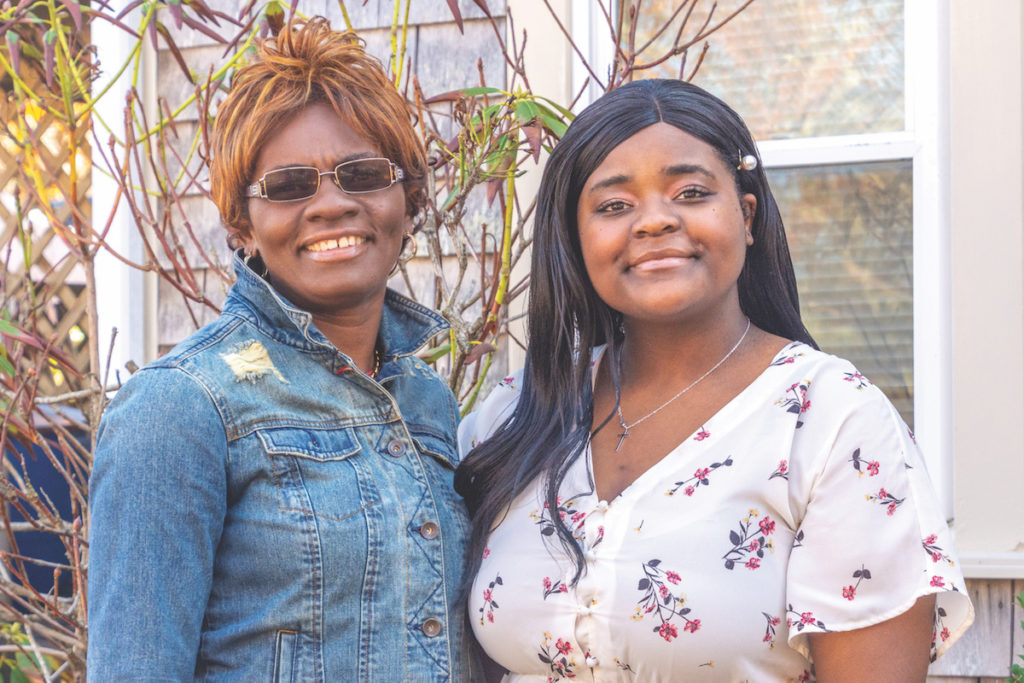
PROVINCETOWN — For Christina Reid, 18 — a freshman at Boston’s Suffolk University, a 2020 graduate of Nauset Regional High School, and a third-through-eighth-grade alumna of Provincetown Schools — receiving this year’s Provincetown Town Scholarship proved to be a more-than-welcome boon.
Reid had saved earnings from seasons of working at the Portuguese Bakery and at Stop & Shop, alongside her mother, Ingrid Mattis, an essential worker at the grocery chain’s checkout counters. She’s applied for “just so many scholarships” and receives a financial aid package from Suffolk. Still, her annual charges are a whopping $61,216 for room, board, and tuition. To Reid, every dollar counts.
“I was considering not going back this spring semester, just to save money — to start working early,” Reid said.
Now, though, Reid doesn’t have to postpone her studies in the name of practicality. The Town Scholarship, which is awarded yearly to a single graduating high school senior who lives in Provincetown and “has achieved a distinguished academic record,” was a tremendous help, she said. “It’s relieved my mom from stress and relieved me from stress.”
Reid will return to Boston for her freshman spring semester. She’ll continue studying psychology (she thinks) with a focus on mental health counseling, sticking to her long-term post-graduation goal (she thinks) of returning to Provincetown and giving back to the community that has given to her.
Her future is bright. But the future of the gift that helped clear the path for her is clouded.
The Town Scholarship award has its origins in Massachusetts law: MGL Part I, Title IX, Chapter 60, Section 3C, which enables towns to fund a scholarship by accepting donations, according to Julia Perry, chair of the Provincetown Scholarship and Trust Administration Committee.
The law allows any city or town to “design and designate a place on its municipal tax bills … whereby the taxpayers of said city or town can voluntarily check off, donate, and pledge an amount” to add to the scholarship pool.
Provincetown’s property tax bill features one of the check-off boxes the law describes. But Perry said that “most people now pay their tax bills automatically — either through their mortgage or as an automatic deduction — and never look at the property tax bill, so the amount in the Town Scholarship Fund has been dropping.”
This year, there was only $4,449.77 in the Town Scholarship fund’s coffers. Based on the strength of Reid’s application — she had, among other accomplishments, the highest GPA of any applicant — the scholarship committee awarded her $4,000, which leaves a scant sum for applicants from the class of 2021.
In the absence of a regular cash stream coming with tax payments, the members of the scholarship committee have decided to spend the next few months fund-raising.
“At a minimum, we would like to raise enough to make a similar award next spring,” Perry said. “Ideally, we would like to raise enough to create a perpetuating fund.”
Donations to the fund may be made online at provincetown-ma.gov/791/Gift-FundsDonate or by sending a check made out to “Town of Provincetown” with “Town Scholarship Fund” on the memo line to the scholarship committee, 260 Commercial St., Provincetown 02657.
The scholarship committee is an advisory board that recommends student winners each year to the select board for approval. The committee is also responsible for the management of two other funds: the biannually awarded John Anderson Francis Scholarship, endowed by the will of Cecilia Francis, and the Capt. Joseph F. Oliver Scholarship Fund, endowed by Capt. Oliver’s will.
Reid was also one of this year’s six recipients of the Francis Scholarship, which is available to students who graduated from Provincetown Schools after 2009 and then graduated from any Cape Cod high school. Graduating high school seniors, students currently enrolled in college, and students enrolled in graduate or professional schools are all eligible to apply for the scholarship.
As of July 31, the Francis Scholarship fund had a balance of $1,130,230.71; of that amount, $605,638.13 was restricted for investment purposes. This year, acting on the committee’s recommendation, the select board awarded $45,000 of the fund’s $524,592.58 expendable balance to its six winners: Reid, Safara Brooker, Mackenzie Edwards, Aleksandar Isailovic, Lilli Osowski, and Katarzyna Sapinska.
The Oliver Scholarship is available to students with home addresses in Truro or Provincetown at the time of their high school graduation who have successfully completed their first year of college — after graduating either from Provincetown High School before 2013 (the year it closed) or from any other Cape Cod high school thereafter.
As of July 31, the Oliver Scholarship fund had a balance of $485,814.69, of which $415,809.73 was restricted for investment purposes. Acting on the committee’s recommendation, the select board awarded $12,500 to five students: Mary Burns, Mackenzie Edwards, Brenden Kaeselau, Nathan Balk King, and Katarzyna Sapinska.
